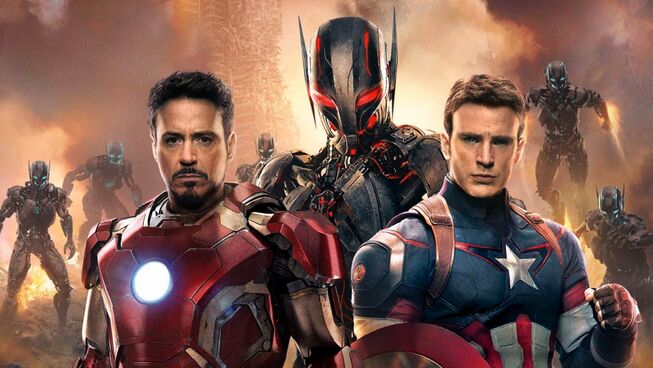
They're back to save the world, but can they save themselves?
Walking into the cinema...
The Avengers was so good, can Age of Ultron live up to the original?
Overall Rating: 4 stars
Cinematic value: 3.5 stars
Big questions value: 4.5 stars
Sometimes in the search for peace, mankind can cause more problems than solutions. It is not much different for The Avengers. In the newest chapter in the lives of our favourite band of superheroes, they have been left to manage the world's villains. After retrieving and studying Loki's sceptre, Tony Stark (Robert Downey Jr.) sees the opportunity to create the ultimate peacekeeper, Ultron (James Spader). In short order, the plan goes awry and due to Stark's arrogance he creates a seemingly omnipotent villain who seeks the eradication of mankind. In his masterplan for mankind's demise, Ultron successfully divides the superhero force. The Avengers have to determine how they can battle the demons within themselves, as well as this new force of evil in the world.
Deja vu is the sensation that a current event or experience has happened previously. It is not necessarily a negative experience, but merely an awareness of the experience. Watching Avengers: The Age of Ultron was a deja vu experience. The original Avengers film was a brilliant mix of superhero personalities, action and humour and the superhero crew is back again. In this new adventure the action is back and director Joss Whedon continues to give a comedic spin that was experienced in the original film. This version was not a bad experience, but seeing The Age of Ultron does conjure up a ‘been there, done that’ feeling. Whedon does enough to add new components and develop key characters to give the story a fresh spin, but it is built on the original story formula. Being aware that most of the character's stories are developed in their individual films, there is minimal opportunity for substantive character development. The development of Hawkeye’s story line did add a needed human touch to the film, but the awkward romantic relationship development between key characters within the team lacked appeal. James Spader adds an effective villainous element to the Ultron character, but is left with the inevitable trap of monologuing blunders that plague supervillians. Ultron is a profile villain and Spader is right for the lead villain role, but the character that would have been worth developing is Ulysses Klaw (Andy Serkis). Hopefully, he will be reintroduced in the future. We get to meet new characters, but with the exception of Vision, they present as one dimensional and fail to add much to the story. One new spin on this story is that the majority of the action occurs outside of the United States. So other countries get to experience the devastation of having the super powers fighting in their local community. The action is spectacular and heart stopping at times, but the future films will need to find other means of assisting with humanities salvation that do not include the total annihilation of large cityscapes. Avengers: The Age of Ultron met many of the expectations for the follow up to the first chapter of this hero chronology by successfully entertaining the audience with the action and cheeky dialogue, but it did not offer much new to the franchise or genre. In the end, Avengers: The Age of Ultron was an enjoyable deja vu experience.
Even though some things were unoriginal, an enjoyable element of this hero adventure was found in the script. Whedon and crew must have a Bible nearby, because it became a key resource for content. Ultron was given some of the best lines of the film and many of them referred to or directly quoted key passages from the accounts of Noah and Jesus. The script was not a theological exercise, by any means, but the whispers of God’s meta-narrative were evident throughout the film. As with all super hero films, the key story relies on the world’s need of a saviour or, in the case of The Avengers, saviours. Whedon manages to show that these heroes are fallible. Unlike Jesus, who is the example of the infallible Saviour, the writing manages to expose the Avengers imperfections and weaknesses. One key example is found in their desire for peace and security. The Avengers answer to world peace seems brilliant and effective, but proves to be problematic. Which opens the door to many considerations of who can be relied upon, if these heroes prove to be susceptible to failure? This is one example amongst many, but does set The Age of Ultron up to be a good mix of discussion points that make this film an engaging experience.
Leaving the cinema...
After the supernova of The Avengers, can the expectation be too high for Avengers: The Age of Ultron? Sure it is, but Marvel has set the bar. Does Joss Whedon rise to the challenge? Yes, he manages to get the job done in his second outing in the franchise. It was action packed, funny and unbelievably exciting, but the franchise will need a fresh fuel line of ideas to keep it from stalling in the future. Go to enjoy the adventure, but do not expect too many surprises.
Reel Dialogue: What are some of the bigger questions to consider from this film?
1. What is the way to 'real' peace?
2. Can we become 'better humans?'
3. What does it mean to work together as a team?
Written by City Bible Forum's Russell Matthews based on a five star rating system @ Russelling Reviews #russellingreviews


